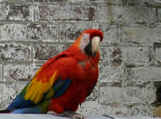
| Amazon Expedition Travel
|
 |
|
|
|

| User Functions
|
|
|
Don't have an account yet? Sign up as a New User
|
|

| Help support this site!
|
|
|
Help support this site... your donations are needed to support research, conservation, and rescue efforts.
|
|

|
 |
| "City Parrots" to investigate the city macaws of Medellin |
 |
Thursday, January 11 2007 @ 12:44 PM UTC
Contributed by: roelantjonker
Views: 7379
|

 Araproject has landed in Medellin, Colombia, where forestry student Carlos Vásquez is presently conducting a pilot study into the Wild parrots of the city. Araproject has landed in Medellin, Colombia, where forestry student Carlos Vásquez is presently conducting a pilot study into the Wild parrots of the city.
The local zoo, Zoológico Santa Fe de Medellín, released several macaws in the '80s when a local law made it illegal for the inhabitants of Colombia to own native species. Overwhelmed by the amount of macaws that were placed in their care they decided to free-range these parrots. They could come and go as they pleased. Food was available for them in aviaries.
These macaws adjusted well to their new surroundings and, much like the Dutch Macaws Araproject has been studying for the last couple of year in the Netherlands, have become very independent of there human caregivers.
The macaws now feed mostly independently and have successfully bred within the city limits. In fact the population is growing.
This amazing ability of parrots to adapt to city environments and establish sizable and stable populations there is interesting for parrot conservation. Since the natural habitats of parrots are disappearing at an alarming rate. Some species have no where left to go and exist only on small pockets of remaining native habitat, stranding them in small islands amidst “development”. Captive management is notoriously expensive and is no long turn solution to parrot conservation.
Cities within the native range of these threatened species could be considered viable habitat alternatives for wild parrot populations. However parrots usually do not make the transition to city life themselves. Habitat imprinting prevents parrots that have grown up in a forest area to recognize a city as potential habitat. They need help. As Zoológico Santa Fe de Medellín has done with their macaws and their adaptive process to city live. Within a few generations populations will became true city parrots.
How successful this transition can be and how desirable it is as a conservation tool will be determined by the study Carlos Vásquez is conducting. Central in his investigation is to find out if the macaw population is indeed expending. If there is hybridisation between the several species and if poaching levels are within carrying capacity.
Next to Araproject this reseach is locally supported by SAO (Sociedad Antioqueña de Ornitología), Área Metropolitana del Valle de Aburra, CORANTIOQUIA (Corporación Autónoma Regional del Centro de Antioquia), Zoológico Santa Fe de Medellín and Periódico el Mundo
You can help us support Carlos and his study by donating trough Paypall.
http://www.araproject.nl/2007/01/06/city-parrots-to-investigate-the-city-macaws-of-medellin/
|
|
|
|

|

|

